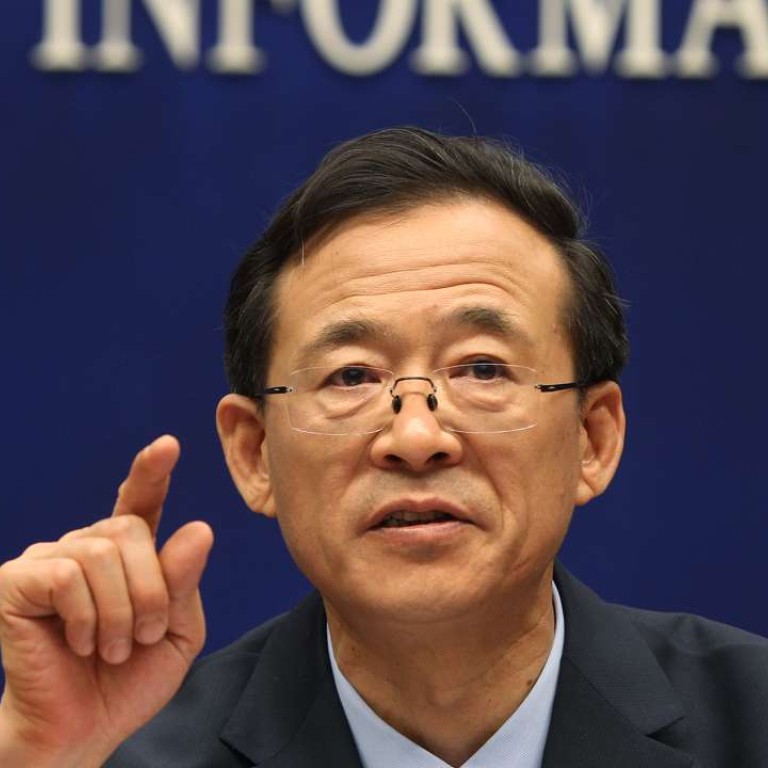
Abnormal share trading highlights Chinese watchdog’s uphill battle to tackle misconduct
The suspension of trading by a rural bank after its shares surged 570 per cent comes just weeks after the regulator vowed to get tough with ‘crocodiles’
Jiangsu Zhangjiagang Rural Commercial Bank (JZRCB) was catapulted into the spotlight after its shares surged more than 570 per cent since its trading debut on January 24.
The rural lender said in a filing to the Shenzhen Stock Exchange on Thursday evening that it would conduct a self-examination and suspend trading from Friday due to “abnormal price swings.”
It didn’t specify when trading would resume.
The suspension, less than three weeks after China’s top securities regulator vowed to eradicate market irregularities, is the latest sign that cracks still remain in the mainland’s capital market and comes amid a massive effort by Beijing to uproot criminal acts that hurt investors’ interests.
Liu Shiyu, chairman of the China Securities Regulatory Commission (CSRC), said at a press conference on February 26 that he was shocked by the chaos he had witnessed in the financial markets since coming into office a year ago. Not one to mince his words, he pledged to punish those “barbarians, demons and evil creatures” that feasted on retail investors’ blood.
The mainland stock market has been plagued by cases of financial misconduct, most commonly insider trading, false information disclosure and churning – selling and buying the same shares through affiliated accounts to rig prices. Retail investors are invariably left carrying the empty bag.
It is not known whether those so-called demons or ‘crocodiles’ – another term used by Liu to refer to unscrupulous investors – are behind JZRCB’s share price jump. But market watchers believe the regulator will step in to uncover the cause of the abnormal trading.
The over-speculative mood surrounding newly listed stocks provides a vivid snapshot of the mainland’s unhealthy stock market
In January, JZRCB raised about 790 million yuan (US$114.5 million) from an initial public offering in which it floated 180.76 million shares at 4.37 yuan apiece.
Its 126.6 million shares slated for online subscription were 1,364.4 times oversubscribed amid public investors’ frenzied buying of IPO stocks.
On Thursday, its shares closed at 29.45 yuan, which translated into 80 times its unaudited earnings per share for 2016.
By comparison, the price-to-earnings ratio of Industrial and Commercial Bank of China, the mainland’s largest lender, stood at 5.6 on Thursday.
Analysts say JZRCB’ fundamentals don’t come anywhere near explaining its lofty share price.
The bank reported a non-performing loan ratio of 1.96 per cent at the end of 2016, compared to the average 1.74 per cent average for all mainland banks.
“The over-speculative mood surrounding newly listed stocks provides a vivid snapshot of the mainland’s unhealthy stock market,” said Wang Feng, chairman of Shanghai-based financial services firm Ye Lang Capital. “It is surprising to see this,now that chairman Liu Shiyu has made his harsh statement targeting illegal trading activities.”
It is common for retail investors in China to chase short-term gains on the stock market regardless of corporate performance. They often do this by purchasing shares in a stock that’s enjoying a strong rally, betting on a further price surge.
But this late buying creates an easy exit for unethical fund managers, whose sudden large-scale selling can send the shares crashing to well below the retail investors’ purchase price.
For example, in late 2016 shares of newly listed Ningbo Haitian Precision Machinery soared 2,186 per cent in 30 trading sessions after their debut on the Shanghai Stock Exchange, hitting 34.29 yuan on December 21.
The stock has since retreated 43 per cent, ending at 19.54 yuan on January 24.
The CSRC has been using big data – the collection of large, complex data sets to analyse digital trading information – to uncover suspicious trades and accounts.
The regulator found 630 cases involving illegal trading in 2016, and launched investigations into 551 of them.
It has recently been reiterating its zero tolerance stance on illegal activities in the market to safeguard small investors.
In mid-2015, the regulator blamed “malicious short-selling” for a market rout that wiped US$5 trillion off market value.
In the wake of the market meltdown, a clutch of senior CSRC officials including vice chairman Yao Gang, and top brokerage officials such as Citic Securities president Cheng Boming were apprehended for suspected wrongdoing.
“Unfortunately, there are still a number of people who turn a blind eye to the regulators’ intensified crackdown on misconduct,” said Ivan Li, a trader with Everbright Securities. “Abnormal trading in companies like Zhangjiagang Rural Commercial Bank show that it will be a drawn-out battle for the regulator to fight against fearless speculators.”
The CSRC fast-tracked IPO approvals in the second half of 2016 to facilitate fundraising by cash-hungry businesses, an apparent move to bolster the slowing economy.
However, every newly listed stock in recent months was met with buying euphoria as investors believed they were safe bets, whose shares would surge after trading started.
Nearly all the stock rallies were followed by a sharp drop that left retail investors with heavy losses.

